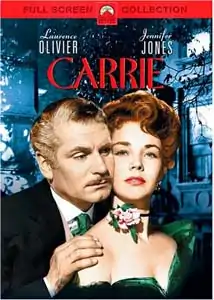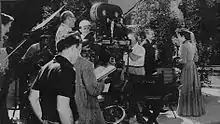| Carrie | |
|---|---|
 DVD release cover | |
| Directed by | William Wyler |
| Written by | Ruth Goetz Augustus Goetz |
| Based on | Sister Carrie by Theodore Dreiser |
| Produced by | Lester Koenig William Wyler |
| Starring | Laurence Olivier Jennifer Jones Miriam Hopkins |
| Cinematography | Victor Milner |
| Edited by | Robert Swink |
| Music by | David Raksin |
Production company | |
| Distributed by | Paramount Pictures |
Release date |
|
Running time | 118 minutes |
| Language | English |
| Budget | $2 million[1] |
| Box office | $1.8 million (US rentals)[2] |
Carrie is a 1952 American drama film based on the novel Sister Carrie by Theodore Dreiser. Directed by William Wyler, the film stars Jennifer Jones in the title role and Laurence Olivier as Hurstwood. Eddie Albert played Charles Drouet. Carrie received two Academy Award nominations: Costume Design (Edith Head), and Best Art Direction (Hal Pereira, Roland Anderson, Emile Kuri).
Plot
Around the turn of the century, Carrie Meeber (Jennifer Jones) leaves her family in a small rural town and heads to Chicago. On the train, salesman Charles Drouet (Eddie Albert) approaches her and the two chat until they reach Chicago.
In South Chicago, Carrie stays with her sister and her husband Sven, but loses her sweatshop sewing job after injuring her hand. After a fruitless day of job hunting, Carrie looks up Drouet. He talks her into having dinner with him at Fitzgerald's, an upscale restaurant, and gives her $10.
Carrie later goes to Fitzgerald's to return the money to Drouet. There she meets George Hurstwood (Laurence Olivier), the manager of the restaurant, who is immediately smitten with her.
Carrie moves in with Drouet. She pressures him to marry her because the neighbors are gossiping, but he tries to distract her and invites Hurstwood to their home. With Drouet's permission, Hurstwood takes Carrie to the theater while Drouet is on a business trip. Hurstwood and Carrie fall in love. Just before she is about to run off with Hurstwood, she finds out he's married. She confronts Hurstwood, who admits that he is married but terribly unhappy.
At the restaurant, Hurstwood cashes up for the night and, by accidentally locking a timed safe, finds himself stuck with $10,000 of his boss's money. He tries to return it, but when he learns that his boss intends to give his salary directly to Hurstwood's wife because of his relationship with Carrie, he decides to take the money to run away with Carrie. He leaves an I-O-U, intent on paying his boss back as soon as he can.

The first few days are blissful, but then reality catches up with them. Hurstwood's boss sends an officer from the bond company to collect the money Hurstwood took. Hurstwood cannot get a job because word of his stealing the money has gotten around, and he and Carrie soon find themselves living in poverty.
Carrie finds out that she is pregnant, and the two think that things might improve. But Hurstwood's wife shows up, wanting his signature and his agreement to sell the house they own jointly. Hurstwood wants his share of the proceeds but she says she will press charges against him for bigamy if he insists. Hurstwood's wife refused to consent to a divorce and Hurstwood didn't know how to tell Carrie.
Hurstwood tells his wife he will sign and not ask for money if she'll grant him a divorce. She does, but it is too late. Carrie loses the baby and decides to try her luck at acting. Hurstwood reads in the newspaper that his son is due in New York after his honeymoon and decides to see him at the docks. While he is there, Carrie leaves him (even though she still loves him) because she thinks he will use this opportunity to re-enter his family's life.
While Hurstwood drifts further into poverty and ends up on the streets, Carrie's star in the theatre rises until she is a well-regarded actress on the cusp of fame. Weak from hunger, Hurstwood visits her at the theatre. She has found out from Drouet that Hurstwood took the money to start a life with her and blames herself for his predicament. She wants to make it up to Hurstwood but he won't take more than a quarter and disappears after toying with the gas burner in her dressing room.
Cast
- Laurence Olivier as George Hurstwood
- Jennifer Jones as Carrie Meeber
- Miriam Hopkins as Julie Hurstwood
- Eddie Albert as Charles Drouet
- Ray Teal as Allen
- Barry Kelley as Slawson
- William Reynolds as George Hurstwood, Jr.
- Mary Murphy as Jessica Hurstwood
- Basil Ruysdael as Mr. Fitzgerald
- Walter Baldwin as Carrie's father
- Dorothy Adams as Carrie's mother
- Melinda Plowman as the next-door neighbour and friend
Production
Wyler was reluctant to cast Jones, but Jones's husband David O. Selznick pushed hard for her to be given the role. The filming was plagued by a variety of troubles: Jones had not revealed that she was pregnant; Wyler was mourning the death of his year-old son; Olivier had a painful leg ailment that made him cranky, and he developed a dislike for Jones; and Hollywood was reeling under the effects of McCarthyism, and the studio was afraid to distribute a film that could be attacked as immoral. Ultimately, the ending was changed to eliminate Hurstwood's suicide and the film was cut to make it more positive in tone. Some critics accused the film of sentimentalizing the novel, box office was weak, and reviews were generally disappointing, although they praised Olivier, who received a BAFTA nomination. Later critics also praised Albert's performance, but most agreed that Jones' was weak. Wyler eventually admitted that the film was too depressing during a time when American audiences wanted escapist entertainment to take their minds off the Cold War.[3]
The film was screened as part of the 13th Venice Film Festival official program.
Accolades
The film is recognized by American Film Institute in these lists:
- 2002: AFI's 100 Years...100 Passions – Nominated[4]
References
- ↑ "It's About Time to Revise Purity Code, Sez Wyler". Variety. 6 Feb 1952. p. 2.
- ↑ 'Top Box-Office Hits of 1952', Variety, January 7, 1953
- ↑ Miller, Frank. 0/Carrie.html "Carrie (1952)", TCM.com, accessed 17 July 2015
- ↑ "AFI's 100 Years...100 Passions Nominees" (PDF). Retrieved 2016-08-18.